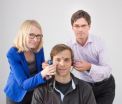(Press-News.org) MADISON — When it comes to science, socioeconomic status may widen confidence gaps among the least and most educated groups in society, according to a new study by researchers at the University of Wisconsin-Madison's Science, Media and the Public research group.
The findings, published in June in the journal Science Communication, show that similar levels of attention to science in newspapers and on blogs can lead to vastly different levels of factual and perceived knowledge between the two groups.
Notably, frequent science blog readership among low socioeconomic-status groups actually lowered their scores on factual tests of scientific knowledge while high levels of attention to science in newspapers caused them to feel they were less knowledgeable compared to those who read less or those from higher socioeconomic backgrounds.
"The science section of The New York Times is not written for audiences with little or no prior knowledge of science and technology," explains study co-author Dominique Brossard, professor and chair in the Department of Life Sciences Communication. "Just putting more science in front of less-educated people may therefore confuse them rather than help them grasp complex science."
The team also found that how science knowledge is measured matters, too — adding clarity to the science of science communication. Basing policy, public engagement and education efforts on just one measure of science knowledge may not be reliable.
"It's important. People make science policy based on the existing data," says graduate student and study lead author Leona Su. "If you're not using the right measures, you won't be using the right data for policymaking."
The research team — led by Brossard, life sciences communication Professor Dietram Scheufele, and communication arts department chair and Professor Michael Xenos — is working to understand how media influences public understanding and support of science, particularly in an ever-evolving Internet world.
For the new study, the team started with the Knowledge Gap Hypothesis, born in 1970, which posits that people of higher socioeconomic status learn faster and more effectively from media like newspapers than less educated members of society.
But just how to measure knowledge between groups has never been settled. Sometimes it's based on the scientific facts people get right in true/false questionnaires. Other times, it's measured by asking people how much they think they know about a scientific topic. The two methods are sometimes used interchangeably.
For their study, the researchers compared the two approaches. They tested both the factual and perceived knowledge of people from high and low socioeconomic groups, focusing on nanotechnology — an important, emerging scientific topic mostly free of partisan bias.
They scored a random sample of participants based on their responses to statements about nanotechnology, using a range of answers from definitely true to likely true and definitely false. The researchers also asked participants to rank on a 10-point scale how informed they felt they were about nanotechnology.
The team then compared each group's scores against their levels of attention to science and technology coverage in newspapers, television and blogs, and their level of participation in discussions about science.
Not only did higher socioeconomic participants feel they knew more about nanotechnology the more science they read in newspapers, their factual knowledge was also higher than frequent newspaper readers in the low socioeconomic group, demonstrating a widened gap between them.
Infrequent readers of science blogs scored similarly on their factual knowledge of nanotechnology, whether they were of high or low socioeconomic status.
For Scheufele, this is a function of Web 2.0 having made science more accessible. "Blogs and other ways of interacting online have allowed citizens to talk science in their own words, repurpose content from newspapers and work through it together. As a result, blogs may be the perfect knowledge leveler for casual science audiences."
But as for the differences between frequent blog readers in the two groups, the researchers can only speculate. The cross-sectional study does not address the underlying causes of the knowledge gaps.
Brossard and Su believe the types of blogs or how they are used may be different between the two groups. People may be getting more caught up in controversy and commentary than in content.
"We know people rely on their values and preexisting attitudes when confronted with science news," says Brossard.
Su says future research at UW-Madison will continue to examine people's willingness to participate in science decision making, how knowledge gaps impact public support for science and how they drive information-seeking behavior.
INFORMATION:
The study was funded by a grant from the National Science Foundation to the UW-Madison Nanoscale Science and Engineering Center in Templated Science and Assembly at the Nanoscale.
—Kelly April Tyrrell, 608-262-9772, ktyrrell2@wisc.edu
Mind the gap: Socioeconomic status may influence understanding of science
2014-07-07
ELSE PRESS RELEASES FROM THIS DATE:
Mechanism that prevents lethal bacteria from causing invasive disease is revealed
2014-07-07
An important development in understanding how the bacterium that causes pneumonia, meningitis and septicaemia remains harmlessly in the nose and throat has been discovered at the University of Liverpool's Institute of Infection and Global Health.
Streptococcus pneumoniae is a 'commensal', which can live harmlessly in the nasopharynx as part of the body's natural bacterial flora. However, in the very young and old it can invade the rest of the body, leading to serious diseases such as pneumonia, sepsis and meningitis, which claim up to a million lives every year worldwide. ...
Non-diet approach to weight management more effective in worksite wellness programs
2014-07-07
COLUMBIA, Mo. – Problematic eating behaviors and dissatisfaction with one's body are familiar struggles among women. To combat those behaviors, which have led to higher healthcare premiums and medical trends, employers have offered worksite wellness programs to employees and their families. However, the vast majority of wellness programs limit their approach to promoting diets, which may result in participants regaining the majority of their weight once the programs end. Now, researchers at the University of Missouri have found that "Eat for Life," a new wellness approach ...
IPCC must consider alternate policy views, researchers say
2014-07-07
In addition to providing regular assessments of scientific literature, the Intergovernmental Panel on Climate Change Process (IPCC) also produces a "Summary for Policymakers" intended to highlight relevant policy issues through data.
While the summary presents powerful scientific evidence, it goes through an approval process in which governments can question wording and the selection of findings but not alter scientific facts or introduce statements at odds with the science. In particular, during this process, the most recent summary on mitigation policies was stripped ...
Teen dating violence cuts both ways: 1 in 6 girls and guys are aggressors, victims or both
2014-07-07
ANN ARBOR, Mich. — Dating during the teen years takes a violent turn for nearly 1 in 6 young people, a new study finds, with both genders reporting acts like punching, pulling hair, shoving, and throwing things.
The startling number, drawn from a University of Michigan Medical School survey of more than 4,000 adolescent patients ages 14 to 20 seeking emergency care, indicates that dating violence is common and affects both genders.
Probing deeper, the study finds that those with depression, or a history of using drugs or alcohol, have a higher likelihood to act as ...
Taking a short smartphone break improves employee well-being, research finds
2014-07-07
MANHATTAN, KAN. — Want to be more productive and happier during the workday? Try taking a short break to text a friend, play "Angry Birds" or check Facebook on your smartphone, according to Kansas State University research.
In his latest research, Sooyeol Kim, doctoral student in psychological sciences, found that allowing employees to take smartphone microbreaks may be a benefit — rather than a disruption — for businesses. Microbreaks are nonworking-related behaviors during working hours.
Through a study of 72 full-time workers from various industries, Kim discovered ...
Sleep deprivation leads to symptoms of schizophrenia
2014-07-07
Twenty-four hours of sleep deprivation can lead to conditions in healthy persons similar to the symptoms of schizophrenia. This discovery was made by an international team of researchers under the guidance of the University of Bonn and King's College London. The scientists point out that this effect should be investigated more closely in persons who have to work at night. In addition, sleep deprivation may serve as a model system for the development of drugs to treat psychosis. The results have now been published in "The Journal of Neuroscience".
In psychosis, there is ...
Study reveals strong links between Antarctic climate, food web
2014-07-07
A long-term study of the links between climate and marine life along the rapidly warming West Antarctic Peninsula reveals how changes in physical factors such as wind speed and sea-ice cover send ripples up the food chain, with impacts on everything from single-celled algae to penguins.
The study, published in today's issue of Nature Communications, is authored by Dr. Grace Saba, an alumna of William & Mary's Virginia Institute of Marine Science (now at Rutgers University); VIMS professor Deborah Steinberg; Dr. Vincent Saba, a VIMS alumnus now at NOAA's National Marine ...
NYU researchers tackle racial/ethnic disparities in HIV medical studies
2014-07-07
A New York University College of Nursing (NYUCN) research team found that a social/behavioral intervention vastly increased the number of African American and Latino individuals living with HIV/AIDS who enrolled in HIV/AIDS medical studies. The intervention, designed by researchers at the NYUCN's Center for Drug Use and HIV Research (CDUHR), found that nine out of ten participants who were found eligible for studies decided to enroll, compared to zero participants among a control group.
The study, called "ACT2," addresses a long-recognized problem: the racial/ethnic ...
Support team aiding caregivers of cancer patients shows success, CWRU researchers report
2014-07-07
Many caregivers of terminal cancer patients suffer depression and report regret and guilt from feeling they could have done more to eliminate side effects and relieve the pain.
So researchers from the nursing school at Case Western Reserve University devised and tested an intervention that quickly integrates a cancer support team to guide caregivers and their patients through difficult end-of-life treatment and decisions.
In the study, caregivers reported a high degree of satisfaction from having a team comprised of an advance practice nurse, social worker, a spiritual ...
Does cycling increase risk for erectile dysfunction, infertility, or prostate cancer?
2014-07-07
New Rochelle, NY, July 7, 2014—Cycling is a popular activity that offers clear health benefits, but there is an ongoing controversy about whether men who ride have a higher risk of urogenital disorders such as erectile dysfunction, infertility, or prostate cancer. The results of a study of nearly 5,300 male cyclists who participated in the Cycling for Health UK Study are presented in an article in Journal of Men's Health, a peer-reviewed publication from Mary Ann Liebert, Inc., publishers. The article is available free on the Journal of Men's Health website at http://online.liebertpub.com/doi/full/10.1089/jomh.2014.0012 ...




